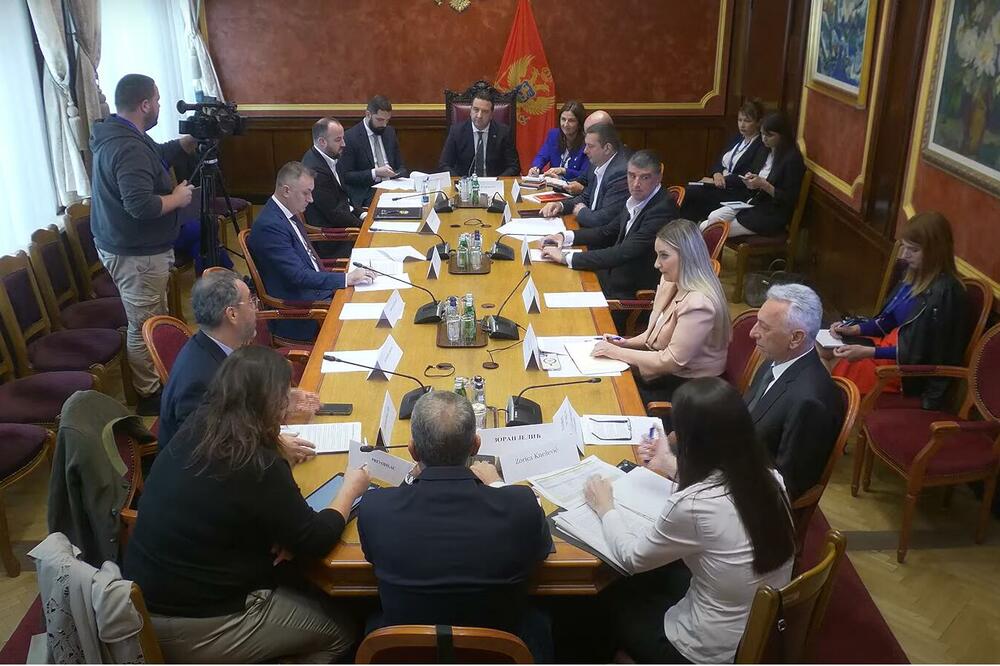The financing of political entities is a topic that is very important for IBAR, according to the recommendations of GRECO and the report of the peer review mission in Montenegro, it is necessary to improve the legal framework that regulates the financing of political entities and election campaigns, said the program manager for the rule of law in the Delegation of the European Union (EU) Gianandrea Vila.
He said this at the fifth session of the Anti-corruption Committee.
"It is a process that has been ongoing for some time. I want to point out that a lot has already been done, however there are certain areas that have not been fully addressed, and I would like to highlight three of them," Vila said.
He emphasized that these are, first of all, the harmonization of the law on the financing of political entities and election campaigns with the misdemeanor code.
"Especially because it is necessary to define political subjects and all subjects as legal entities. This refers to coalitions and groups on electoral lists. The second area refers to non-financial donations in accordance with EU recommendations. The third area is the need to amend the law on political entities and election campaigns in accordance with the law on deputies and councilors," added Vila.
Political parties during elections should not spend more funds than they collect
Senator in the State Audit Institution (DRI) Zoran Jelić said that they fully share the observations of Villa, whose findings, he said, coincide with the findings of the DRI.
"Political subjects submit the final accounts and annual reports to the SAI no later than March 31 of the current year for the previous year," Jelić said.
He clarified that audit reports are public, and that they are published on the website of the State Audit Institution.
Referring to the legal provisions, Jelić specified that the SAI is obliged to audit the consolidated financial statements of political entities for the previous year, which, as he said, relate to regular operations, however "the control of financing and supervision of political entities during the election campaign is carried out by the Agency for prevention of corruption (ASK)"
Jelić emphasized that they submitted certain proposals for amendments to the Law on Financing of Political Entities to the Committee for Comprehensive Electoral Reform.
"We proposed that political entities for the purposes of the election campaign cannot spend more funds than they collect. We also proposed that all financing be done through giro accounts, that is, to limit cash transactions," he added.
The Committee does not receive the documents that the SAI sends to the Assembly
President of the Anti-corruption Committee, Jevto Eraković, assessed that it is good to hear that there is a harmony between the findings of the SAI and the opinion of the EU Delegation.
He recalled that at the last Committee, Laura Zampeti from the EU Delegation pointed out that after the meeting of the Delegation with the SAI, they had positive experiences and "regret that many of your recommendations have not yet been implemented."
"As far as the Board is concerned, we do not receive the documents that you send to the Assembly, even though we are directly responsible, that is, we should be responsible for everything related to the fight against corruption," said Eraković.
Vila stated that Montenegro is a small country, and that, however, there are other small countries in the EU whose legal framework has been significantly improved, as he stated, by the very entry into the European Union.
"The EU delegation is currently focused a lot on IBAR. All issues from IBAR that all countries that later joined the EU had to comply with. IBAR cannot be adapted to the individual needs of countries in the EU accession process," added Vila.
He pointed out that in the last six months, a lot has been done, especially when it comes to, as he stated, the rule of law sector.
The President of the Security and Defense Committee, Miodrag Laković, assessed that financing through the media is a subtle way of political influence.
"DRI can in some way link the law regulating the media in Montenegro with political influence in campaigns," he added.
Bonus video:





